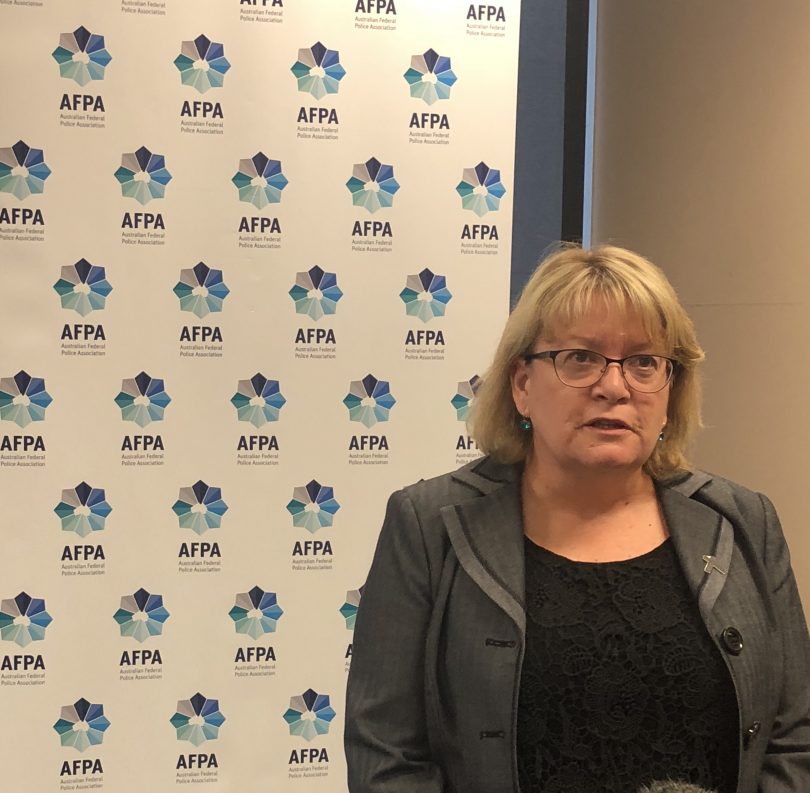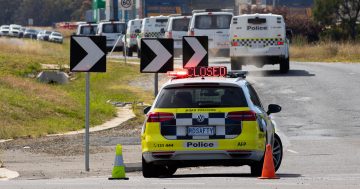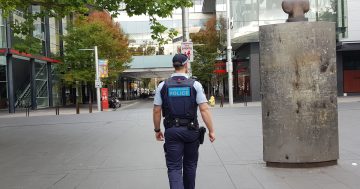
The Australian Federal Police Association has called for more officers to be allocated to the ACT under a new agreement between the Commonwealth and ACT Government. Photo: Dominic Giannini.
ACT Policing officers need better mental health treatment, and more personnel is required to effectively manage a growing Territory, according to the police union.
The president of the Australian Federal Police Association (AFPA), Angela Smith, said there is still a lot of work to be done within the force, and new methods need to be explored to better take care of officers.
“There is always more we can do in that area,” Ms Smith told an ACT Legislative Assembly Committee hearing on Tuesday, 16 June.
“Mental health is a big problem with police officers and certainly frontline workers. Support is often a personalised thing – not everyone wants the same cookie-cutter approach, but I think everyone can do a bit better.
“Police do not necessarily go in to become psychologists and into that organisational health area. [Services are] set up by civilian staff who do not know what it is like to be a police officer on the ground and going to traumatic incidents.
“That lived experience with civilian staff is not there and that is possibly where the gap is.”
Addressing complex mental health cases – specifically, some of the issues relating to returning to work after experiencing a traumatic incident – relies on adequate support and compensation for employees who are suffering, added Ms Smith.
Comcare – the Federal Government’s statutory authority that deals with compensable injury or illness for workers, including Australian Federal Police (AFP) employees – will pay 100 per cent of an officer’s wage for 45 weeks while they are off work, but after that period elapses, the wage would drop by 25 per cent.
However, the AFPA still needs to cover some psychological hospital admissions that the AFP does not cover.
The drop in compensation and difficulty accessing payments subsequently forces officers in troubled financial situations to return to work earlier than they should, AFPA’s media and government relations manager, Troy Roberts, told the committee.
“We all know you cannot put a time frame on your mental health recovery,” he said.
“So after 45 weeks, members’ wages drop by 25 per cent and we know that impacts on the wellbeing of the member and we also know they return to work before they actually should.”

AFPA president Angela Smith says police officers cannot keep up with an increase in the ACT’s population while employment numbers in the force remain stagnant. Photo: File.
Ms Smith said the Federal Government needs to explore new methods for dealing with compensation for police personnel suffering from mental health issues related to their work.
“Some of these members have complex PTSD [post-traumatic stress disorder] and 45 weeks out of the workplace is nowhere near enough for that recovery,” she said.
“More work to ensure people can come back part-time, and in an area where they are not going to be re-injured.”
The AFPA also called for the provision of more police officers under the agreement between the Commonwealth and ACT Government.
Under the agreement, policing services are “purchased” by the ACT from the AFP, which was worth around $170 million in the last ACT Budget.
The current agreement, which was signed in 2017, is set to expire in the middle of 2021, and the ACT Legislative Assembly Committee was established to provide recommendations to the ACT Government.
Ms Smith said officer numbers have been stagnant despite an increase in the ACT’s population and a larger jurisdiction as urban interface expands.
“We cannot expand our numbers in the ACT to any great degree so that has to be the one thing that is problematic each time [the agreement] comes up,” said Ms Smith.
“If that can be looked at each year to see if it is the right number for us and if it should be increased. We are quite tight with numbers and there does not seem to be a lot of movement in that area.”
ACT Policing has 930 full-time equivalent staff, and more than 60 extra staff will be added during the next four years as part of the ACT’s 2019-2020 Budget.
However, the AFPA said more money needs to be funneled into policing infrastructure in the ACT as the buildings used by officers are mainly ACT Government assets.
“I think there is a lot more in relation to maintenance and new building aspects,” said Ms Smith.
“The city station is way too old, the traffic operations centre is a complete mess, and Gungahlin station is way too small – it was never built for the size that Gungahlin is now. It was built as a part-time station and you can see from the size of it.”
The Gungahlin station has been running full-time for around a decade, the committee was told.




















